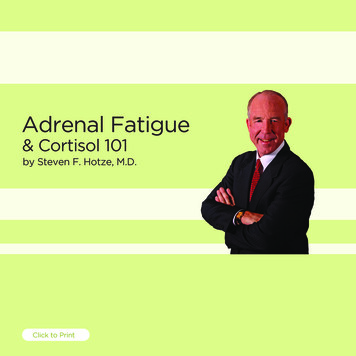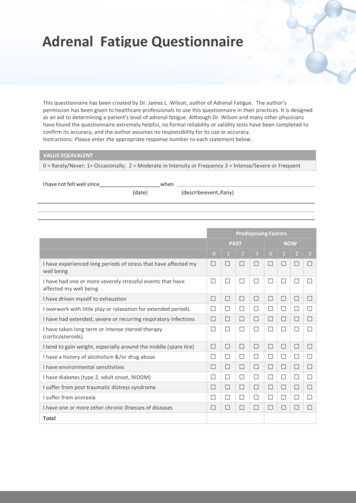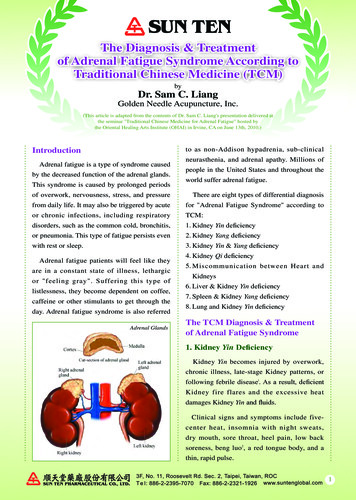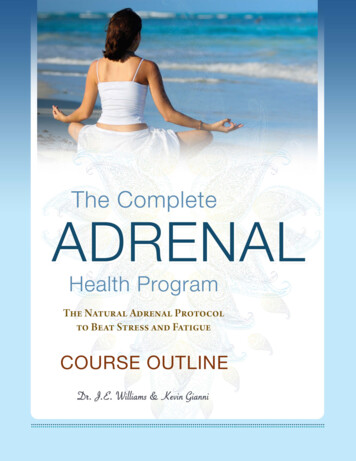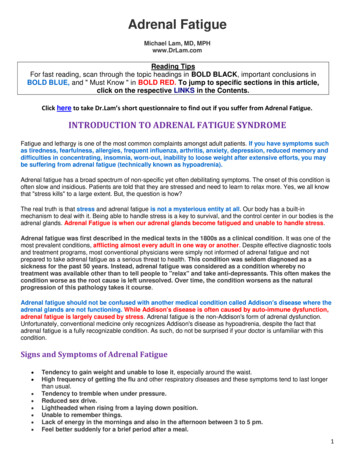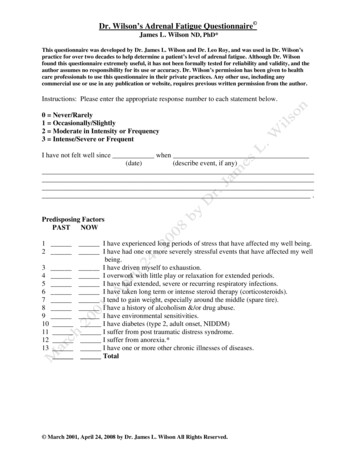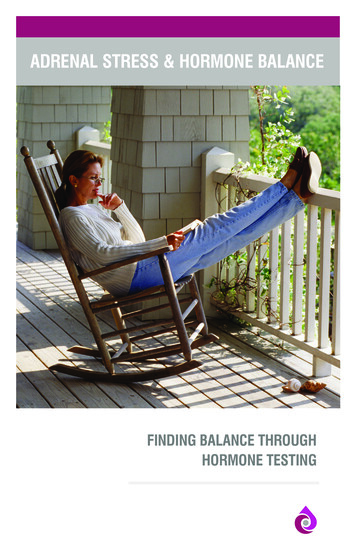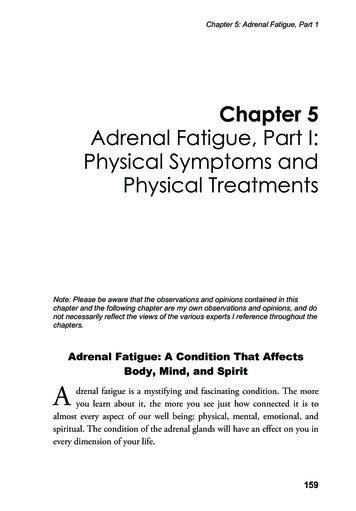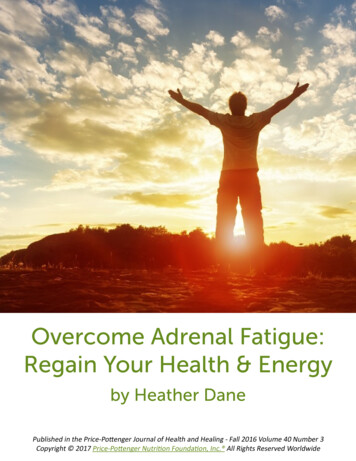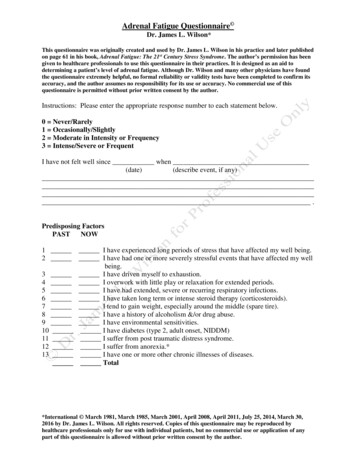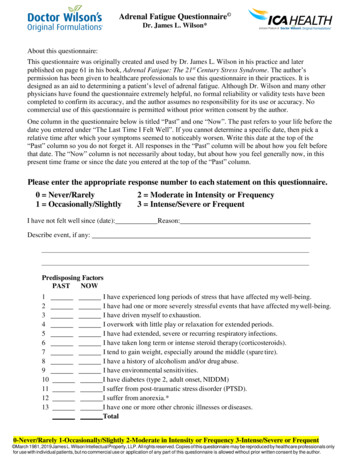
Transcription
Adrenal Fatigue Questionnaire Dr. James L. Wilson*About this questionnaire:This questionnaire was originally created and used by Dr. James L. Wilson in his practice and laterpublished on page 61 in his book, Adrenal Fatigue: The 21st Century Stress Syndrome. The author’spermission has been given to healthcare professionals to use this questionnaire in their practices. It isdesigned as an aid to determining a patient’s level of adrenal fatigue. Although Dr. Wilson and many otherphysicians have found the questionnaire extremely helpful, no formal reliability or validity tests have beencompleted to confirm its accuracy, and the author assumes no responsibility for its use or accuracy. Nocommercial use of this questionnaire is permitted without prior written consent by the author.One column in the questionnaire below is titled “Past” and one “Now”. The past refers to your life before thedate you entered under “The Last Time I Felt Well”. If you cannot determine a specific date, then pick arelative time after which your symptoms seemed to noticeably worsen. Write this date at the top of the“Past” column so you do not forget it. All responses in the “Past” column will be about how you felt beforethat date. The “Now” column is not necessarily about today, but about how you feel generally now, in thispresent time frame or since the date you entered at the top of the “Past” column.Please enter the appropriate response number to each statement on this questionnaire.0 Never/Rarely1 Occasionally/SlightlyI have not felt well since (date):2 Moderate in Intensity or Frequency3 Intense/Severe or FrequentReason:Describe event, if any:Predisposing FactorsPASTNOW12345678910111213I have experienced long periods of stress that have affected my well-being.I have had one or more severely stressful events that have affected my well-being.I have driven myself to exhaustion.I overwork with little play or relaxation for extended periods.I have had extended, severe or recurring respiratory infections.I have taken long term or intense steroid therapy (corticosteroids).I tend to gain weight, especially around the middle (spare tire).I have a history of alcoholism and/or drug abuse.I have environmental sensitivities.I have diabetes (type 2, adult onset, NIDDM)I suffer from post-traumatic stress disorder (PTSD).I suffer from anorexia.*I have one or more other chronic illnesses or diseases.Total0-Never/Rarely 1-Occasionally/Slightly 2-Moderate in Intensity or Frequency 3-Intense/Severe or Frequent March 1981, 2019 James L. Wilson Intellectual Property, LLP. All rights reserved. Copies of this questionnaire may be reproduced by healthcare professionals onlyfor use with individual patients, but no commercial use or application of any part of this questionnaire is allowed without prior written consent by the author.
Adrenal Fatigue Questionnaire Dr. James L. Wilson*Key Signs & 232425262728293031My ability to handle stress and pressure has decreased.I am less productive at work.I seem to have decreased cognitive ability. I don’t think as clearly as I used to.My thinking is confused when hurried or under pressure.I tend to avoid emotional situations.I tend to shake or am nervous when under pressure.I suffer from nervous stomach indigestion when tense.I have many unexplained fears/anxieties.My sex drive is noticeably less than it used to be.I get lightheaded or dizzy when rising rapidly from a sitting or lying position.I have feelings of graying or blacking out.I am chronically fatigued; a tiredness that is not usually relieved by sleep.*I feel unwell much of the time.I notice that my ankles are sometimes swollen (the swelling is worse in theevening).I usually need to lie down or rest after sessions of psychological or emotionalpressure/stress.My muscles sometimes feel weaker than they should.My hands and legs get restless and/or I experience meaningless body movements.I have become allergic or have increased frequency/ severity of allergic reactions.When I scratch my skin a white line remains for a minute or more.Small irregular dark brown spots have appeared on my forehead, face, neck, andshoulders.I sometimes feel weak all over.*I have unexplained and frequent headaches.I am frequently cold.I have decreased tolerance for cold.*I have low blood pressure.*I often become hungry, confused, shaky, or somewhat paralyzed under stress.I have lost weight without reason while feeling very tired and listless.I have feelings of hopelessness or despair.I have decreased tolerance. People irritate me more.The lymph nodes in my neck are frequently swollen (swollen glands).I have times of nausea and vomiting for no apparent reason.*Total0-Never/Rarely 1-Occasionally/Slightly 2-Moderate in Intensity or Frequency 3-Intense/Severe or Frequent March 1981, 2019 James L. Wilson Intellectual Property, LLP. All rights reserved. Copies of this questionnaire may be reproduced by healthcare professionals onlyfor use with individual patients, but no commercial use or application of any part of this questionnaire is allowed without prior written consent by the author.
Adrenal Fatigue Questionnaire Dr. James L. Wilson*Energy PatternsPASTNOW12345678910111213I often have to force myself in order to keep going. Everything seems like a chore.I am easily fatigued.I have difficulty getting up in the morning (may not wake up until about 10am).I suddenly run out of energy.I usually feel much better and fully awake after my midday meal (lunch).I often have an afternoon low between 3pm-5pm.I get low energy, moody or foggy if I do not eat regularly.I usually feel my best after 6pm.I am often tired at 9pm-10pm, but resist going to bed.I like to sleep late in the morning.My best, most refreshing sleep often comes between 7am-9am.I often do my best work late at night (early in the morning).If I’m not asleep by 11pm, I get a burst of energy around 11pm (may last until 1-2am)TotalFrequently Observed EventsPASTNOW1I get coughs/colds that stay around for several weeks.2I have frequent or recurring bronchitis, pneumonia or other respiratory infections.3I get colds and/or other respiratory illness (including asthma) two ormore times per year.4I frequently get rashes, dermatitis, or other skin conditions.5I have rheumatoid arthritis.6I have allergies to several things in the environment.7I have multiple chemical sensitivities.8I have chronic fatigue syndrome.9I get pain in the muscles on the sides of my neck.10I have insomnia or difficulty sleeping.11I have fibromyalgia.12I suffer from asthma.13I suffer from hay fever.14I suffer from nervous breakdowns.15I get pain in the muscles of my upper back and lower neck for no apparent reason.16My allergies are becoming worse (more sever, frequent, or diverse).17The fat pads on the palms of my hands and/or tips of my fingers are often red.18I bruise more easily than I used to.19I have a tenderness in my back near my spine at the bottom of my rib cage whenpressed.20I have under eye swelling upon rising (goes away after a couple of hours).Total0-Never/Rarely 1-Occasionally/Slightly 2-Moderate in Intensity or Frequency 3-Intense/Severe or Frequent March 1981, 2019 James L. Wilson Intellectual Property, LLP. All rights reserved. Copies of this questionnaire may be reproduced by healthcare professionals onlyfor use with individual patients, but no commercial use or application of any part of this questionnaire is allowed without prior written consent by the author.
Adrenal Fatigue Questionnaire Dr. James L. Wilson*The next two questions are for women only:PAST12NOWI have increasing symptoms of premenstrual syndrome (PMS) such as cramps, bloating,moodiness, irritability, emotional instability, headaches, tiredness, and/or intolerancebefore my period (only some of these need to be present).My periods are generally heavy, but they often stop, or almost stop, on the fourth day,only to start up profusely on the 5th or 6th day.Food PatternsPAST NOW123456I need coffee, caffeine, or some other stimulant to get going in the morning.I often crave food high in fat and feel better with high fat foods.I use high fat foods to drive myself.I often use high fat foods and caffeine drinks (coffee, colas, etc.) to drive myself.I often crave salt and/or foods high in salt. I like salty foods.I feel worse if I eat high potassium foods (like bananas, figs, & rawpotatoes), especially if I eat them in the morning.I crave high protein foods (meats, cheeses).I crave sweet foods (pies, cakes, pastries, dried fruits, candies, or desserts).I feel worse if I miss or skip a meal.789TotalAggravating FactorsPASTNOW12345678910I have constant stress in my life or work.My dietary habits tend to be sporadic and unplanned.I do not exercise regularly.My relationships at work and/or home are unhappy.My life contains insufficient enjoyable activities.I have little control over how I spend my time.I restrict my salt intake.I have gum and/or tooth infections or abscesses.I have meals at irregular timesI eat lots of fruitTotalRelieving FactorsPASTNOW12345I feel better almost right away once a stressful situation is resolved.Regular meals decrease the severity of my symptoms.I often feel better after spending a night out with friends.I often feel better if I lie down.Other relieving factorsTotal0-Never/Rarely 1-Occasionally/Slightly 2-Moderate in Intensity or Frequency 3-Intense/Severe or Frequent March 1981, 2019 James L. Wilson Intellectual Property, LLP. All rights reserved. Copies of this questionnaire may be reproduced by healthcare professionals onlyfor use with individual patients, but no commercial use or application of any part of this questionnaire is allowed without prior written consent by the author.
Adrenal Fatigue Questionnaire Dr. James L. Wilson*Scoring and Interpretation of the QuestionnaireA lot of information can be obtained from this questionnaire.Follow the instructions below carefully to score your questionnaire correctly.Then proceed to the interpretation section.Total Number of Questions Answered1. First count the total number of questions in each section that you answered with any number other thanzero. Enter the “Past” and “Now” totals separately, entering each in appropriate boxes for each sectionof the “ Total number of questions answered” scoring chart below. For example, if you answered a totalof 21 questions in the “past” column and 27 questions in the “now” column of the “Key Signs andSymptoms” with a 1, 2 or 3, your total number of questions answered score for the “past” column wouldbe “21” and for the “now” column would be “27.” Note that there are no entries for the first section ofthe questionnaire entitled “Predisposing Factors.” This section is dealt with separately and is notincluded in the summary below. Therefore, your first entry into the summary boxes will be for the “KeySigns and Symptoms” section.2. After you have finished entering the number of questions answered in both columns for each section,sum all the numbers for each column and the total in the “Grand Total – Total Number of QuestionsAnswered” boxes on the bottom row of the scoring chart.3. All the boxes in the “Total Number of Questions Answered” chart should now be filled.Then go on to the next part of the scoring.Total Number of Questions Answered with Above 0Name of SectionTotal AnsweredPastNowKey Signs & SymptomsNumber of questions 31Energy PatternsNumber of questions 13Frequently Observed EventsNumber of questions 20 for men, 22 for womenFood PatternsNumber of questions 9Aggravating FactorsNumber of questions 10Relieving FactorsNumber of questions 4Grand Total – Total Numberof Questions Answered with Above 00-Never/Rarely 1-Occasionally/Slightly 2-Moderate in Intensity or Frequency 3-Intense/Severe or Frequent March 1981, 2019 James L. Wilson Intellectual Property, LLP. All rights reserved. Copies of this questionnaire may be reproduced by healthcare professionals onlyfor use with individual patients, but no commercial use or application of any part of this questionnaire is allowed without prior written consent by the author.
Adrenal Fatigue Questionnaire Dr. James L. Wilson*TOTAL POINTS:This part of the scoring adds up the actual numbers (0, 1, 2, or 3) you put beside the questions when youwere answering the questionnaire. Add these numbers for each column in each section and enter them intothe appropriate boxes in the chart below. Then, sum each column to get the Total-Points – Now scores.Enter these totals in the bottom 2 boxes to complete this part of the scoring.Name of SectionTotal PointsPast NowKey Signs & SymptomsTotal Points possible 93Energy PatternsTotal Points possible 39Frequently Observed EventsTotal Points possible 60 for men, 66 for womenFood PatternsTotal Points possible 27Aggravating FactorsTotal Points possible 30Relieving FactorsTotal Points possible 12Total Points SEVERITYTotal Number of Questions Answered with Above 0SEVERITY INDEX Total Points Divided by TotalQuestions Answered Above 0Asterisk Total –Total Points Questions Marked with *Interpreting the QuestionnaireThe questionnaire is a valuable tool for determining IF you have adrenal fatigue and, if you do, theSEVERITY of your syndrome. Of course, the accuracy of its interpretation depends upon you completingevery section as accurately and honestly as possible. Because there is such diversity in how individualsexperience adrenal fatigue, a wide variety of signs and symptoms have been included. Some people haveonly the minimal number of symptoms, but the symptoms they do have are severe. Others experience agreat number of symptoms, but most of their symptoms are relatively mild. This is why there are two kindsof scores to indicate adrenal fatigue.Total Number of Questions Answered with a Number Above 0: This gives you a general “Yes or No”answer to the question, “Do I have adrenal fatigue?” First look at your “Grand Total – Total Number ofQuestions Answered Above 0” scores in the first scoring chart. The purpose of this score is to see the totalnumber of signs and symptoms of adrenal fatigue you have. There are a total of 87 questions for men and 89questions for women in the questionnaire. If you responded with a number above “0” to more than 26 (men)or 32 (women) of the questions, (regardless of which severity response number you gave the question), youhave some degree of adrenal fatigue. The greater the number of questions that you have respondedaffirmatively to, the greater your adrenal fatigue. If you responded affirmatively to less than 20 of thequestions, it is unlikely adrenal fatigue is your problem. People who do not have adrenal fatigue may stillexperience a few of these indicators in their lives, but not many of them. If your symptoms do not includefatigue or decreased ability to handle stress, then you are probably not suffering from adrenal fatigue.0-Never/Rarely 1-Occasionally/Slightly 2-Moderate in Intensity or Frequency 3-Intense/Severe or Frequent March 1981, 2019 James L. Wilson Intellectual Property, LLP. All rights reserved. Copies of this questionnaire may be reproduced by healthcare professionals onlyfor use with individual patients, but no commercial use or application of any part of this questionnaire is allowed without prior written consent by the author.
Adrenal Fatigue Questionnaire Dr. James L. Wilson*Total Points: The total points are used to determine the degree of severity of your adrenal fatigue. Ifyou ranked every question as 3 (the worst) your total points would be 261 for men and 267 for women.If you scored under 40, you either have only slight adrenal fatigue or none at all. If you scored between44-87 for men or 45-88 for women, then overall you have a mild degree of adrenal fatigue. This doesnot mean that some individual symptoms are not severe, but overall your symptom picture reflectsmildly fatigued adrenals. If you scored between 88-130 for men or 89-132 for women, your adrenalfatigue is moderate. If you scored above 130 for men or 132 for women, then consider yourself to besuffering from severe adrenal fatigue. Now compare the total points of the different sections with eachother. This allows you to see if 1 or 2 sections stand out as having more signs and symptoms than theothers. If you have a predominating group of symptoms, they will be the most useful ones for you towatch as indicators as you improve. Seeing which sections stand out will also be helpful in developingyour own recovery program.Severity Index: The Severity Index is calculated by simply dividing the total points by the total numberof questions you answered in the affirmative. It gives an indication of how severely you experience thesigns and symptoms, with 1.0-1.6 being mild, 1.7-2.3 being moderate, and 2.4 on up being severe. Thisnumber is especially useful for those who suffer from only a few of these signs and symptoms, but yetare considerably debilitated by them.Suggested Use Charts: Follow the chart that correlates with the degree of severity as follows:Mild – Basic Support, Moderate – Intermediate Support, Severe – Maximum SupportPast vs. Now: Now compare the Total Points in the “Past” column to the Total Points in the “Now”column. The difference indicates the direction your adrenal health is taking. If the number in the “Past”column is greater than the number in the “Now” column, then you are slowly recovering fromhypoadrenia. It is a good sign you are recovering, but you will still want to read the following chaptersto accelerate your improvement. If the number in the “Now” column is greater than the number in the“Past” column, your adrenal glands are on a downhill course and you need to take immediate action toprevent further decline and to recover. Now complete the section below before you finish reading therest of the book.Asterisk Total:Finally, add the actual numbers you put beside the questions marked by asterisks (*) for the “Now”column. If this total is more than 9, you are likely suffering from a relatively severe form of adrenalfatigue. If this total is more than 12, and you answer yes to more than 2 of the questions below, youhave many of the indications of true Addison’s disease and should consult a physician in addition todoing the things in this book.Answer the following questions on the next page only if you scored more than 12 on the questionsmarked with an asterisk (*).Additional Symptoms (ones that are present now)The areas on my body listed below have become bluish-black in color.Inside of lips/mouth vagina areolaFrequent unexplained diarrhea.Increased darkening around bony areas, folds in my skin, scars, and creases in my joints.Light colored patches on my skin where the skin has lost its usual color.I easily become dehydrated.I have fainting spells.0-Never/Rarely 1-Occasionally/Slightly 2-Moderate in Intensity or Frequency 3-Intense/Severe or Frequent March 1981, 2019 James L. Wilson Intellectual Property, LLP. All rights reserved. Copies of this questionnaire may be reproduced by healthcare professionals onlyfor use with individual patients, but no commercial use or application of any part of this questionnaire is allowed without prior written consent by the author.
Adrenal Fatigue Questionnaire Dr. James L. Wilson*Interpretation of the “Predisposing Factors” Section: This section helps determine which factorsled to the development of your adrenal fatigue. There may have been only one factor or there mayhave been several, but the number does not matter. One severely stressful incident can be all it takesfor someone to develop adrenal fatigue, although typically it is more. This list is not exhaustive, butthe items listed in this section are the most common factors that lead to adrenal fatigue. Use thissection to better understand how your adrenal fatigue developed. Seeing how it started often makesclearer what actions you can take to successfully recover from it. This section also leads into afollowing section that explores in more depth how your adrenal fatigue developed.Dr. Wilson’s Adrenal FatigueProtocol - Suggested UseOnce the patient has taken theAdrenal Fatigue Questionnaire, the scoringfrom this will determine the level of severity.Follow the chart that correlates withtheir level of severity as follows:Mild – Basic Support,Moderate – Intermediate SupportSevere – Maximum SupportFor optimal results, take the protocols assuggested for a minimum of 6 months for basicsupport and discontinue gradually. (Formaximum support, it may take up to 2 years.) AR – Adrenal RebuilderAC – Adrenal CSA – Super Adrenal Stress FormulaHA – Herbal Adrenal Support Formula( o – Drops )START LOW & GO SLOWIt is ideal to start one level below your recommended level of support. (See full chart on back.) Ifthings are going okay for 4-5 days, move up a level. If not, wait another 4-5 days and then moveup. If necessary, move down a level for a few days, depending on how you feel. Continue thisprocess until you reach your desired level of support.Long Term SupportFor optimal long-term results, I recommend that your patient follow the Program and productProtocol, read the book and follow up with you in six months for retesting. Typically, werecommend the patient stay on the Program for at least six months and up to two yearsdepending upon their level of severity. We encourage you to call our knowledgeable staff forany questions regarding my adrenal fatigue Protocol, becoming a professional partner or otherproduct related questions.0-Never/Rarely 1-Occasionally/Slightly 2-Moderate in Intensity or Frequency 3-Intense/Severe or Frequent March 1981, 2019 James L. Wilson Intellectual Property, LLP. All rights reserved. Copies of this questionnaire may be reproduced by healthcare professionals onlyfor use with individual patients, but no commercial use or application of any part of this questionnaire is allowed without prior written consent by the author.
published on page 61 in his book, Adrenal Fatigue: The 21st Century Stress Syndrome. The author's permission has been given to healthcare professionals to use this questionnaire in their practices. It is designed as an aid to determining a patient's level of adrenal fatigue. Although Dr. Wilson and many other
